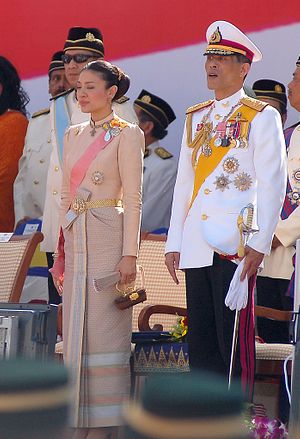The fairy tale finally ended, somewhat bitterly. Having been the royal consort for more than a decade, Princess Srirasmi, the official wife of Thailand’s Crown Prince Maha Vajiralongkorn, the only heir apparent to the throne, was stripped of her royal titles. Shortly after, it was reported that she volunteered to resign from the Thai royal family and is returning to her commoner’s roots taking the former name of “Miss Srirasmi Suwadee.”
It is now confirmed that on December 10, Crown Prince Vajiralongkron divorced his third wife, Srirasmi. Weeks earlier, a series of arrests of Srirasmi’s close relatives, who were allegedly involved in corruption, seemed to suggest that a separation was imminent. Her uncle, former Central Investigation Bureau chief Pongpat Chayapan, was charged with graft involving alleged extortion and oil smuggling as well as lèse-majesté. Meanwhile, her three brothers, Natthapol, Sitthisak, and Narong, and sister Sudathip were similarly accused of defaming the monarchy. As a result, Vajiralongkorn requested that the government remove the royally bestowed family name — Akkrapongpreecha — from his wife’s family members.
A statement released by the palace declares that Srirasmi would return to her hometown in Rachaburi, West of Bangkok, to live a quiet life. King Bhumibol Adulyadej has reportedly offered 200 million baht (around $6 million) to compensate for the divorce. Srirasmi has left her only child, Prince Dipankorn Rasmichoti, 9, in the care of her former husband. This will allow him to maintain his deserved royal titles. Prince Dipankorn departed Bangkok on December 12 for Munich, where he will be put in a local school. Accompanying him was Vajiralongkorn’s new royal consort, Maj. Gen. Suthida Vajiralongkorn, who is tipped to become the next queen.
The shift in position of Srirasmi is significant because it will have a direct effect on the imminent royal succession. In the near future the Crown Prince will elevate his new wife, who will become the future queen of Thailand. But she is a relative unknown. The Thai royal family has mainly survived in the age of democracy largely because, among many factors, it has remained popular. But the idea of the Crown Prince becoming the next monarch with a mysterious wife unnerves many Thais.
The shift will also impact the royal succession in the next generation. According to the Succession Law, an heir to the throne must be the first male born within royal wedlock. Thus, Prince Dipankorn, despite upholding his royal titles, is disqualified from the throne. Rumor has it that the new consort of the Crown Prince has already given birth to a baby boy. If this is true, the young prince is likely to become the heir apparent after his father becomes king.
The dramatic incident within the Thai royal court has also become an inexorable part of the current political crisis. Previously, Vajiralongkorn had forged a close relation with former Prime Minister Thaksin Shinawatra, widely loathed by the royal and military elites. As a result, Vajiralongkorn was never their favorite choice. He was isolated and never saw support from influential figures in the palace.
But his father, King Bhumibol, is frail. Bhumibol’s recent birthday, December 5, a much-anticipated date in the Thai calendar, passed by without the king’s appearance. His mother, Queen Sirikit, has suffered strokes and has not been seen in public since 2011. The Bhumibol era is waning and the royal transition is looming. The coup of May 22 sent out a strong signal that the military, backed by the royal elites, wanted to take control of the process.
Vajiralongkorn thus found the need to reconcile with the military and the royal elites. Walking away from Thaksin and building a bridge with the army would smooth the path for him. The divorce helped lubricate the wheels, since Srirasmi was never accepted by the royal elites due to her questionable past. Many Thai elites said that they would never prostrate in front of a bar girl, the former life of Srirasmi. It appears that Vajiralongkorn is cleaning up his house before the big event.
But this also represents a dilemma for Vajiralongkorn. On the one hand, he has made his backers in the military and the palace happy. The deal into which he has entered with them may possibly bring some stability to the throne. But on the other hand, abandoning his wife this way, just as he did his second wife, Sujarinee Vivacharawongse (who sought exile in the United States), has darkened the already murky image of the Crown Prince. For many Thais, he will rise to the top position with no charisma, no moral authority, and little of their respect.
At the same time as palace politics unfold, the Crown Prince has been unusually active in his duty. He officially endorsed the coup when he agreed to preside over the opening session of the National Legislative Assembly in August. In royal news shown daily on TV at 8 pm, Thais see much more of their prince going out and about, reflecting that he is taking the role of future king seriously.
The royal breakup and the new activism of Vajiralongkorn lead us to conclude that he is ready to step up to the crown. The next question is: what direction will Thailand take while under his kingship? Will he follow in the footsteps of his father — periodically interfering in politics to defend the royal power? Or will he choose to reform the monarchy — lifting it above politics? Only time will tell.
Pavin Chachavalpongpun is associate professor at Kyoto University’s Center for Southeast Asian Studies.

































